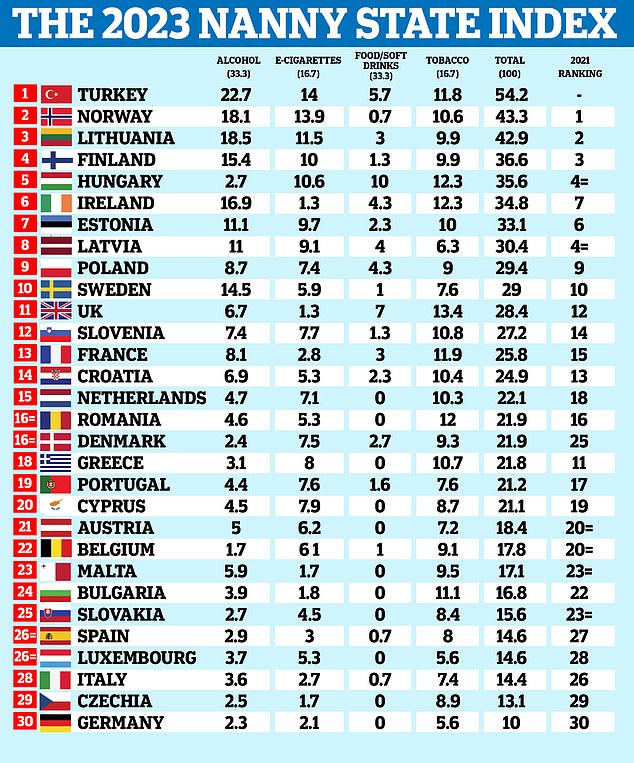Britain’s nanny state is expanding with greater restrictions on junk food, tobacco and alcohol than many comparable countries, a study reveals.
The UK has the most restrictive tobacco regulation in Europe and the second harshest food and drink rules, according to the 2023 Nanny State Index.
It ranks in the middle of the pack, at 13th out of 30, for alcohol restrictions but has among the highest alcohol taxes.
Overall, the UK is now the 11th most meddlesome country for lifestyle restrictions, up one spot since the last ranking in 2021.
However, the UK and Ireland have the most liberal policies on e-cigarettes, the research by the Institute of Economic Affairs and the European Policy Information Centre shows.

Overall, the UK is now the 11th most meddlesome country for lifestyle restrictions, up one spot since the last ranking in 2021
Turkey is the most restrictive place to eat, drink, smoke and vape in Europe, while Germany is the most liberal.
The league table gives each European country a score out of 100 according to how it regulates private lifestyle choices.
The UK is ranked the worst country in Europe to be a smoker due to its high taxes, plain packaging and smoking ban.
It has the second most restrictive food and drink policies including a tax on sugary drinks and food marketing restrictions.
And Britons also face among the highest alcohol taxes in Europe, with Scotland enforcing minimum alcohol pricing and banning some alcohol discounts.
Overall, Turkey takes the top spot in the ranking, followed by Norway and Lithuania in second and third respectively.
Germany gets the lowest score, making it the most liberal country in Europe, followed by Czechia and Italy.
Today’s ranking comes as the Conservative government and Labour opposition are considering further nanny state measures including banning ‘buy 2, get 1 free’ offers, extending restrictions on food advertising and expanding the sugar tax.
Report author Christopher Snowdon, head of lifestyle economics at the IEA, predicts that ‘things will only get worse’ with more nanny state regulations on the way.
It says the UK’s overall rating is significantly improved by a ‘common-sense approach’ to e-cigarettes, which are the least restrictive in Europe.
Furthermore, the UK’s alcohol duties have fallen in real terms after being frozen for several years although that is set to change with a large tax hike in August.
The report says that despite rapid growth in regulations, there is little evidence that ‘paternalistic policies’ are effective.
It finds no correlation between stricter drinking, eating, smoking, and vaping regulations and higher life expectancy.
Mr Snowdon said: ‘With the UK introducing some of the world’s most nannying policies on food, it’s no surprise to see it rising up the league table against stiff competition.
‘The UK scores poorly in every category except e-cigarettes where it is the best in show.
‘Scotland and Wales drag down the overall score by having minimum pricing for alcohol, and the UK as a whole is the worst place in Europe to be a smoker.
‘With alcohol taxes rising sharply this year and more food regulation to come, things will only get worse.’
The number of countries that now place sin taxes on sugary drinks has risen from five in 2017 to twelve in 2023 and in most countries, taxes on sugary drinks also include artificially sweetened beverages.
Fifteen of the countries have a tax on e-cigarette fluid, up from eight in 2017.
The report says: ‘The big picture is one of a constantly expanding nanny state raising prices and trampling freedom.
‘The blame for this lies mainly with domestic governments, although the European Union is always keen to interfere and has banned flavoured heated tobacco products since the last edition was published (with an exemption for menthol).’














